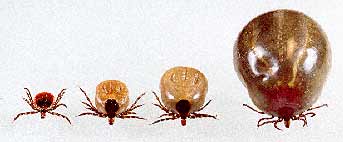 Nashville, TN – After a record-setting number of Rocky Mountain spotted fever cases in the state last year, almost 700, the Tennessee Department of Health is reminding residents and visitors to start thinking now about prevention of tick bites.
Nashville, TN – After a record-setting number of Rocky Mountain spotted fever cases in the state last year, almost 700, the Tennessee Department of Health is reminding residents and visitors to start thinking now about prevention of tick bites.
“If the warmer weather is motivating you to be outside working or playing, just remember ticks can be found out there too, in rural and urban areas alike, and they are always looking for a free ride and meal,” said Abelardo Moncayo, Ph.D., with the TDH Division of Communicable and Environmental Diseases and Emergency Preparedness. “Tick bites should never be taken lightly; they can carry many diseases, including potentially deadly Rocky Mountain spotted fever.”

RMSF and other tick-borne illnesses can have devastating effects, but are effectively treated with antibiotics. Persons with symptoms should see their medical provider for early diagnosis and treatment.
Tick-borne diseases are best prevented by avoiding tick bites.
Some tips from the Tennessee Department of Health include:
- Wear light-colored clothing to help you spot ticks that may catch a ride on you.
- Tuck pants into socks to keep ticks off your legs.
- Use insect repellants such as DEET, Picaridin, oil of lemon eucalyptus or IR3535 on your skin, following all label recommendations for usage. Pay particular attention to recommendations for use on children, and never apply any of these products around the mouth or eyes at any age. Consult your health care provider if you have questions. Repellants containing DEET must be reapplied every few hours.
- Certain products containing permethrin are recommended for use on clothing, shoes, bed nets and camping gear. Permethrin is highly effective as an insecticide. Permethrin-treated clothing repels and kills ticks, mosquitoes and other pests and retains this effect after repeated laundering. Some commercial products are available pretreated with permethrin. Permethrin is not to be used directly on skin.
- Search your entire body for ticks upon return from a potentially tick-infested area. Remove any tick you find on your body; grasp with tweezers and pull straight back if the tick is attached.
- Check children for ticks, especially in their hair, when returning from potentially tick-infested areas.
- Ticks may also be carried into your home on clothing and pets, so examine both carefully.
- Reduce tick habitats around your home by removing leaf litter and brush.
For more information on preventing tick bites, go to www.cdc.gov/ticks/avoid/on_people.html.
About the Tennessee Department of Health
The mission of the Tennessee Department of Health is to protect, promote and improve the health and prosperity of those who live in, work in or visit Tennessee.
For more information about TDH services and programs, visit http://health.state.tn.us/.


